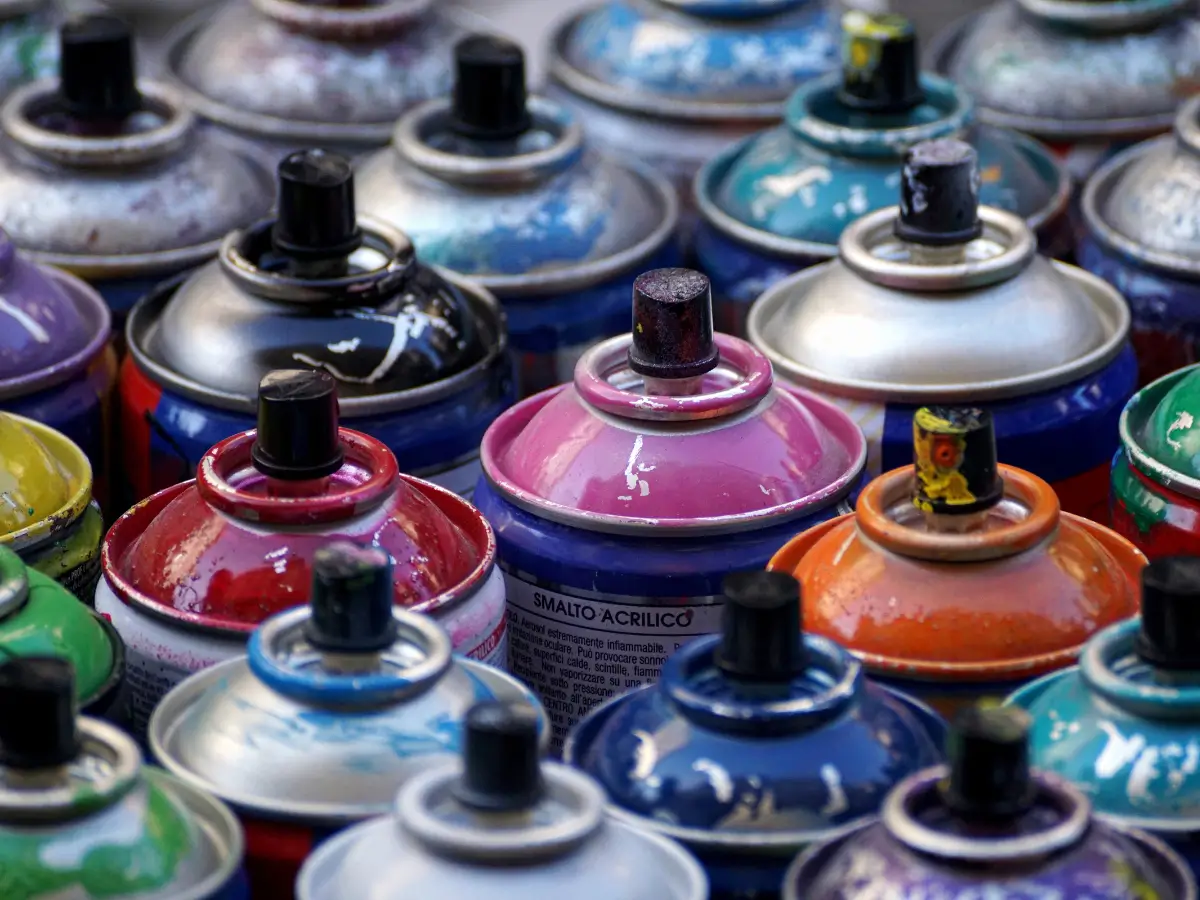5 Mistakes to Avoid When Recycling Aerosol Cans

There is a safe way to dispose of aerosol cans for metal recycling through recycling or HHW programs when available. Have you ever wondered what to do with spray cans after they're done?
There is a safe way to dispose of aerosol cans for metal recycling through recycling or household hazardous waste programs where available.
Have you ever wondered what to do with spray cans after they're done? It can be confusing how to dispose of spray paint cans, spray deodorant, shaving cream cans, and disinfectant spray cans. There are specific procedures to make sure they can be disposed of or recycled safely. It also depends on who does the recycling. Is it your local recycling program or your household hazardous waste program, and does either of them have the capability to handle these types of products?
Aerosol cans are made with either aluminum or steel, which makes them suitable as a recyclable material. The fact that they contain pressurized air, and sometimes harmful materials makes the preparation for aerosol can recycling critical. Here are some of the common mistakes to avoid.
1. Leaving the cap on
Most aerosol cans come with a plastic cap while the can itself is metal. Obviously metal and plastic don't get recycled in the same way, so it is important to remove the plastic cap from the metal can. Most (but not all) of these plastic caps are made from polypropylene which is a #5 plastic. Check to see if your local program accepts #5 plastics before placing the cap in your recycling bin.
If you are using a spray can that includes a small plastic straw for targeted spray, please discard the straw into the trash.
2. Not making sure the can is empty
If there is any substance still left in an aerosol can, it must be discarded through your household hazardous waste program, no matter what. Aerosol cans that still have substances left inside are still pressurized, meaning they could explode or combust if punctured or crushed, making a dangerous situation for a trash compactor or recycling sorter.
Keep waste and recycling workers safe and make sure aerosol cans are completely empty if your local waste or recycling program accepts them. To ensure you've completely emptied a can, hold it close to a rag and spray until nothing else comes out. This is a great way to double check that it is empty.
3. Trying to depressurize the can yourself
Even if the can is empty, never try to puncture, crush, or flatten the can yourself. This could be very dangerous if pressure is still in the can. There are also government regulations in place for the safe depressurization of cans due to the risk of harmful chemicals or air pollutants. There are many ways in which a recycling facility or household hazardous waste program can safely depressurize the can and recycle it properly. They never would require residents to depressurize a can themselves.
4. Attempting to remove the nozzle
Even though the nozzle is plastic and may have some other materials, such as rubber, attached to the spray mechanism, you should not remove it. If you were thinking it should be separated to go with plastic recycling, that wouldn't work anyway because the piece is too small to make it through a recycling sorter anyway.
If you try to remove the nozzle yourself, you are unnecessarily putting yourself at risk of the can exploding. Removing the nozzle may depressurize the can and cause it to burst. Once again, household hazard waste programs are able to depressurize aerosol cans safely for proper recycling.
5. Assuming which bin it goes in
This is the most confusing part, and the part you need to know. Every location is different, so it is important you look up exactly where your municipality accepts aerosol cans. There is one clear rule though in any location, if there is still any substance left in the can, you must dispose of it through your household hazardous waste program.
When the aerosol can is empty, it could be accepted in your recycling program, your household hazardous waste program, or your municipality may ask you to dispose of it in the trash. Don't assume it will go one place or the other. You have to look it up. A great way to look it up is with the What Goes Where search tool on the Recycle Coach app on your mobile phone. Otherwise, you should contact your local household hazardous waste program to find out where you should bring your aerosol cans for safe recycling or disposal.
You might also like...
5 Mistakes to Avoid When Recycling Aerosol Cans

There is a safe way to dispose of aerosol cans for metal recycling through recycling or HHW programs when available. Have you ever wondered what to do with spray cans after they're done?
There is a safe way to dispose of aerosol cans for metal recycling through recycling or household hazardous waste programs where available.
Have you ever wondered what to do with spray cans after they're done? It can be confusing how to dispose of spray paint cans, spray deodorant, shaving cream cans, and disinfectant spray cans. There are specific procedures to make sure they can be disposed of or recycled safely. It also depends on who does the recycling. Is it your local recycling program or your household hazardous waste program, and does either of them have the capability to handle these types of products?
Aerosol cans are made with either aluminum or steel, which makes them suitable as a recyclable material. The fact that they contain pressurized air, and sometimes harmful materials makes the preparation for aerosol can recycling critical. Here are some of the common mistakes to avoid.
1. Leaving the cap on
Most aerosol cans come with a plastic cap while the can itself is metal. Obviously metal and plastic don't get recycled in the same way, so it is important to remove the plastic cap from the metal can. Most (but not all) of these plastic caps are made from polypropylene which is a #5 plastic. Check to see if your local program accepts #5 plastics before placing the cap in your recycling bin.
If you are using a spray can that includes a small plastic straw for targeted spray, please discard the straw into the trash.
2. Not making sure the can is empty
If there is any substance still left in an aerosol can, it must be discarded through your household hazardous waste program, no matter what. Aerosol cans that still have substances left inside are still pressurized, meaning they could explode or combust if punctured or crushed, making a dangerous situation for a trash compactor or recycling sorter.
Keep waste and recycling workers safe and make sure aerosol cans are completely empty if your local waste or recycling program accepts them. To ensure you've completely emptied a can, hold it close to a rag and spray until nothing else comes out. This is a great way to double check that it is empty.
3. Trying to depressurize the can yourself
Even if the can is empty, never try to puncture, crush, or flatten the can yourself. This could be very dangerous if pressure is still in the can. There are also government regulations in place for the safe depressurization of cans due to the risk of harmful chemicals or air pollutants. There are many ways in which a recycling facility or household hazardous waste program can safely depressurize the can and recycle it properly. They never would require residents to depressurize a can themselves.
4. Attempting to remove the nozzle
Even though the nozzle is plastic and may have some other materials, such as rubber, attached to the spray mechanism, you should not remove it. If you were thinking it should be separated to go with plastic recycling, that wouldn't work anyway because the piece is too small to make it through a recycling sorter anyway.
If you try to remove the nozzle yourself, you are unnecessarily putting yourself at risk of the can exploding. Removing the nozzle may depressurize the can and cause it to burst. Once again, household hazard waste programs are able to depressurize aerosol cans safely for proper recycling.
5. Assuming which bin it goes in
This is the most confusing part, and the part you need to know. Every location is different, so it is important you look up exactly where your municipality accepts aerosol cans. There is one clear rule though in any location, if there is still any substance left in the can, you must dispose of it through your household hazardous waste program.
When the aerosol can is empty, it could be accepted in your recycling program, your household hazardous waste program, or your municipality may ask you to dispose of it in the trash. Don't assume it will go one place or the other. You have to look it up. A great way to look it up is with the What Goes Where search tool on the Recycle Coach app on your mobile phone. Otherwise, you should contact your local household hazardous waste program to find out where you should bring your aerosol cans for safe recycling or disposal.
You might also like...
Let's work together
We’re a proud partner to 1,700+ municipalities across North America and beyond. From local problems to larger initiatives, we’d love to have a conversation. Send us a note and we’ll be in touch as soon as possible.
